Dogs in distress
Network for Animals’ Dogs in Distress campaign aims to give as many animals as possible a life free from pain and suffering.
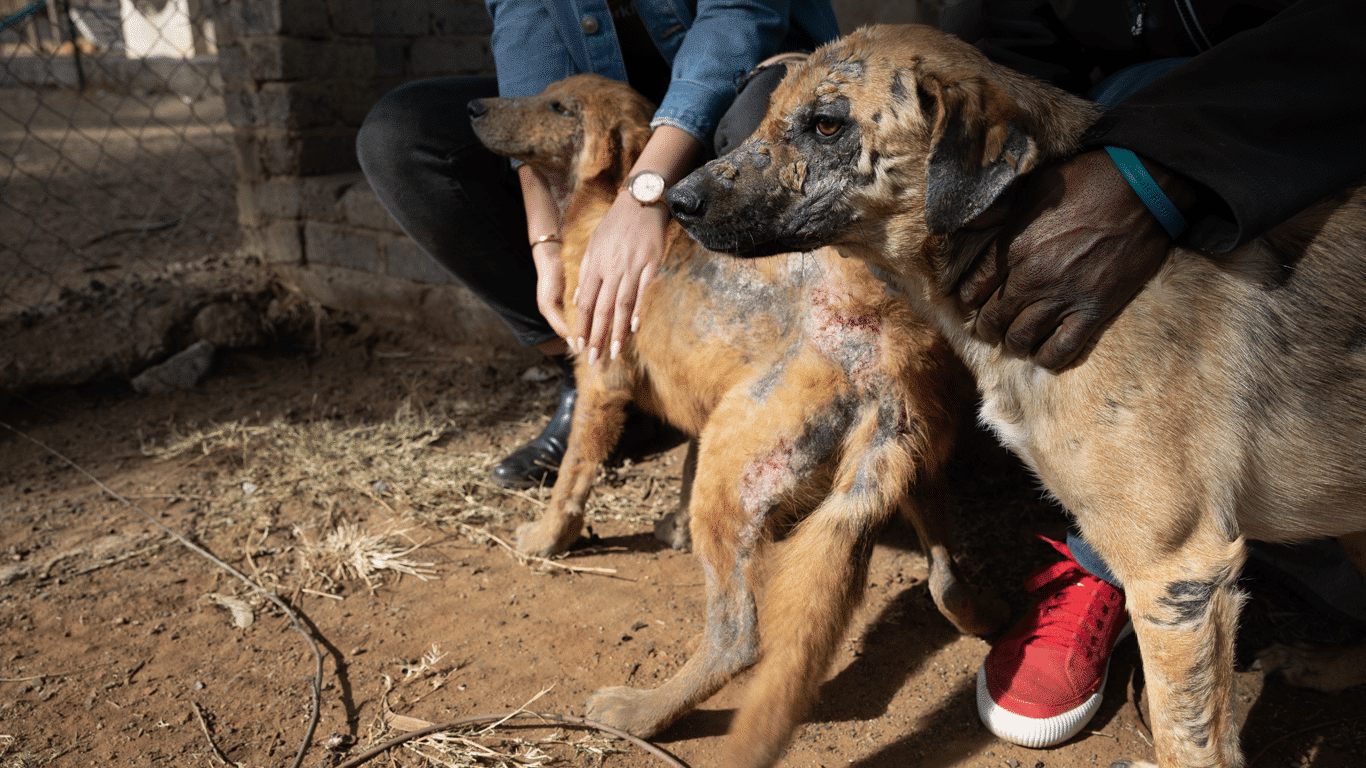
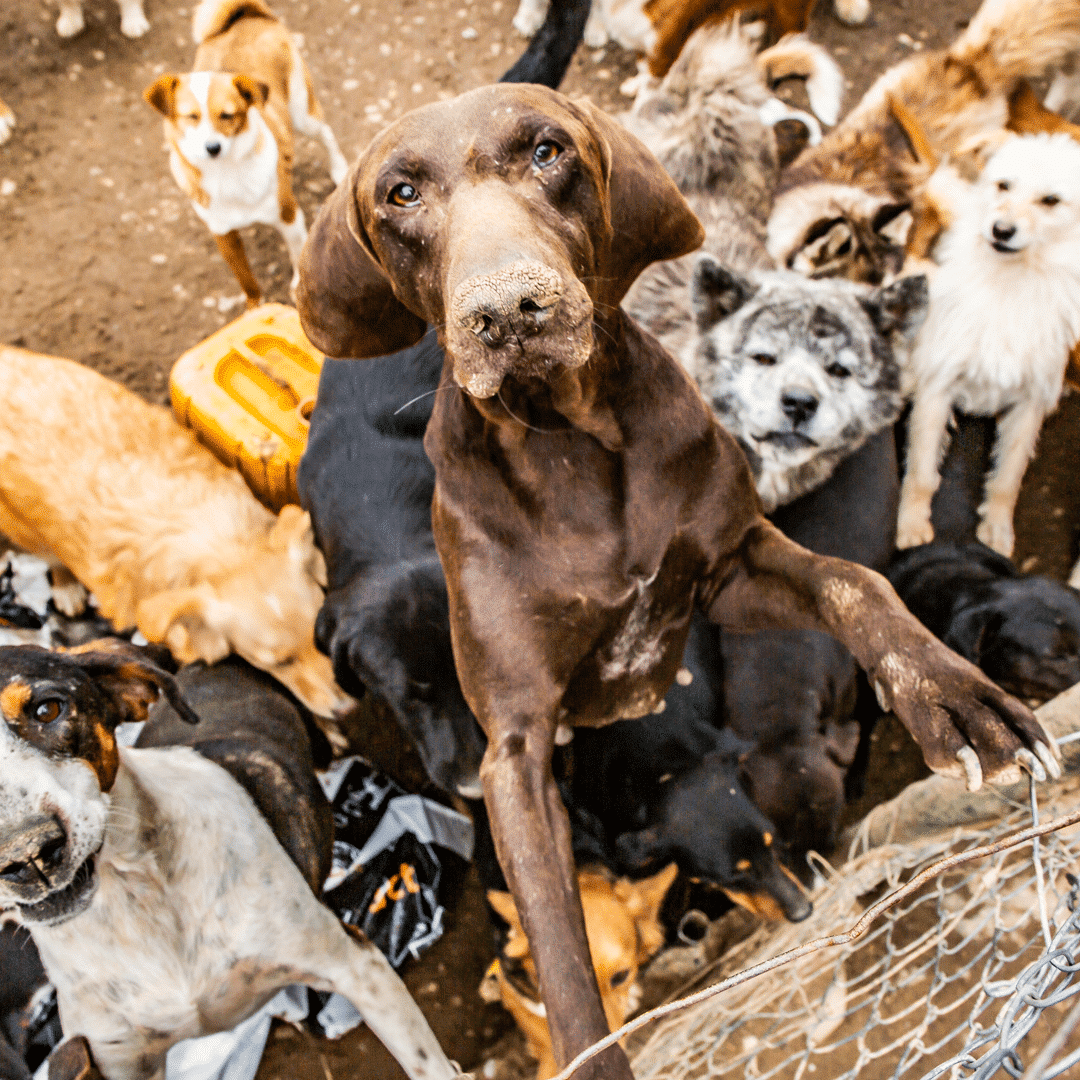
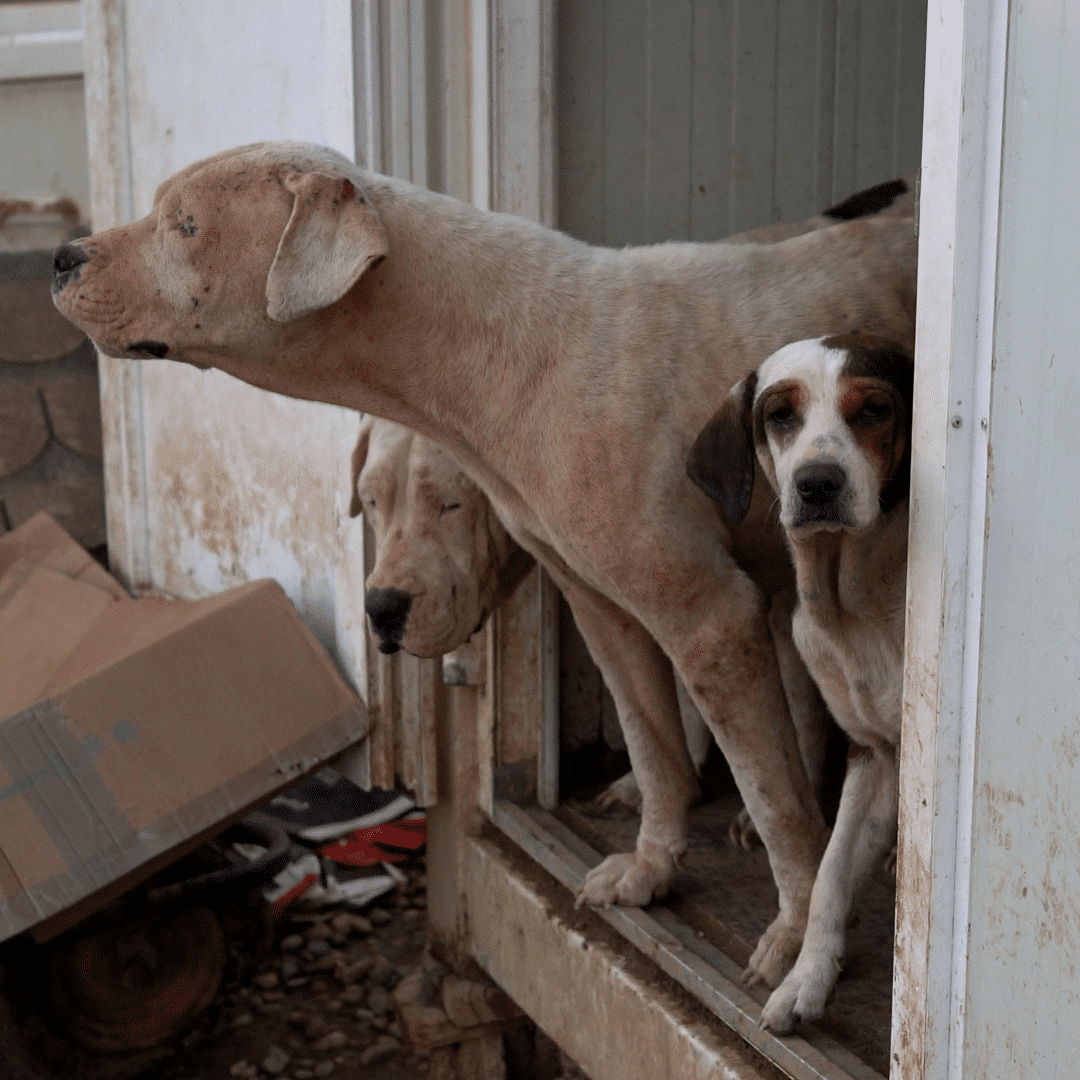

Man's best friend, abandoned and abused.
Humanity in general cares deeply for dogs and we know that they care about us in return, offering us companionship, love and unshakeable loyalty. But statistics reveal that far too many dogs are in distress. According to the American magazine National Geographic, there are more than 300 million street dogs worldwide.
As the first domesticated species, dogs have been man’s best friend for a very long time. While the timing and location of dog domestication remain a controversy, several researchers believe that the event took place somewhere in northern Eurasia between 18,800 and 32,000 years ago. What we know for sure is that our ancestors chose to live with dogs and were even buried with them. In exchange for picking the bones of hunters, dogs defended humans against potential threats. Today, in a similar fashion, dogs beg for our scraps and remain as protective as ever. Dogs have always had our well-being in mind… so why do so many people fail to show them kindness?
Suffering from extreme hunger, deadly disease and human cruelty, street dogs have an average lifespan of three to six years, significantly shorter than the average lifespan for dogs. Network for Animals works to provide these creatures with food, safe shelter and timely medical attention, including vital vaccinations and sterilizations.
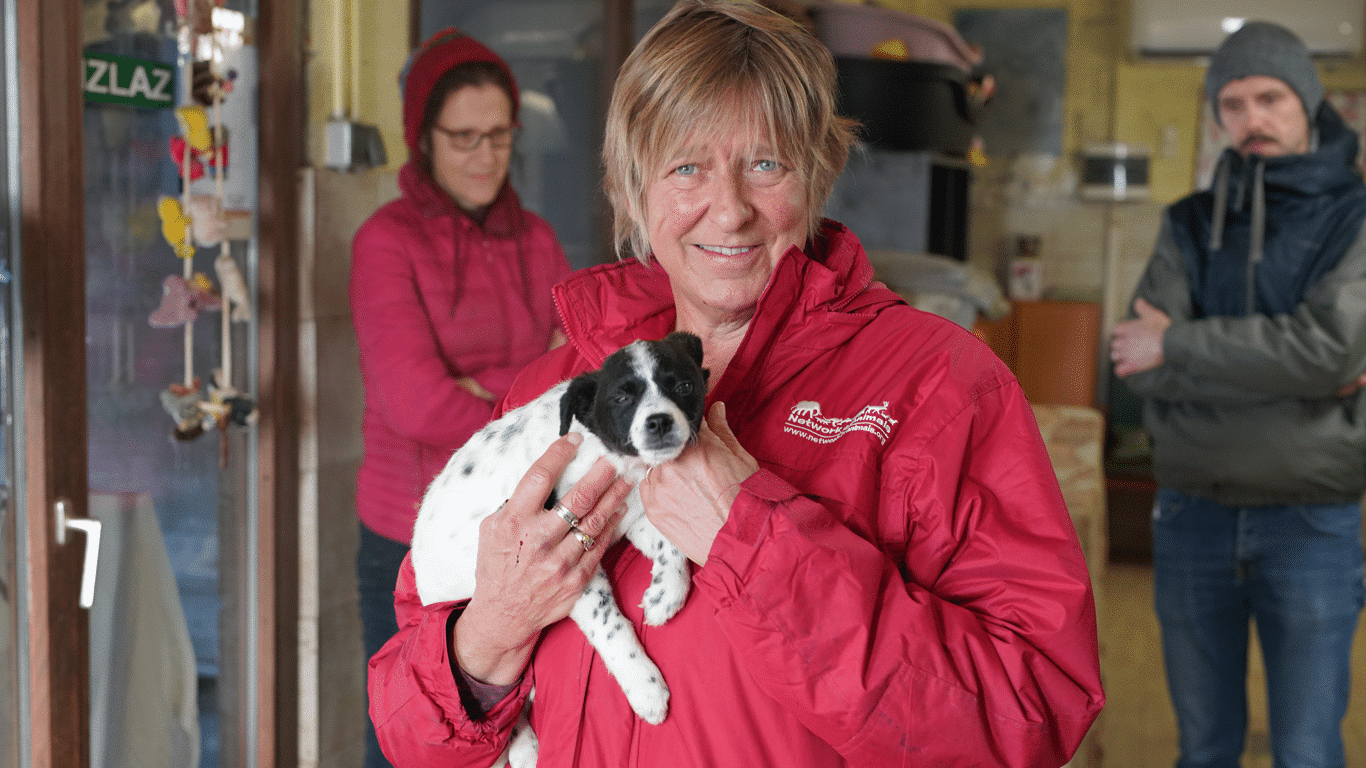

Croatia
Dogs of the Roma Villages
For most dogs who live in the Roma villages of northern Croatia, life is a living hell. Chained, starved and thirsty, Roma animals endure unimaginable suffering. To make a bad situation worse, Roma criminals run dog-fighting rings in which huge sums are gambled on which dog will be savaged to death by another. The criminals also run puppy mills, where dogs are selectively bred for viciousness.
Our partner, the Cakovec shelter, regularly visits the Roma villages to rescue, rehabilitate and rehome suffering dogs and currently looks after 600 rescued animals in their inundated shelter. To support their life-saving work, we helped them feed and care for the hundreds of dogs in their care, who have been saved from lives of trauma in Roma villages.
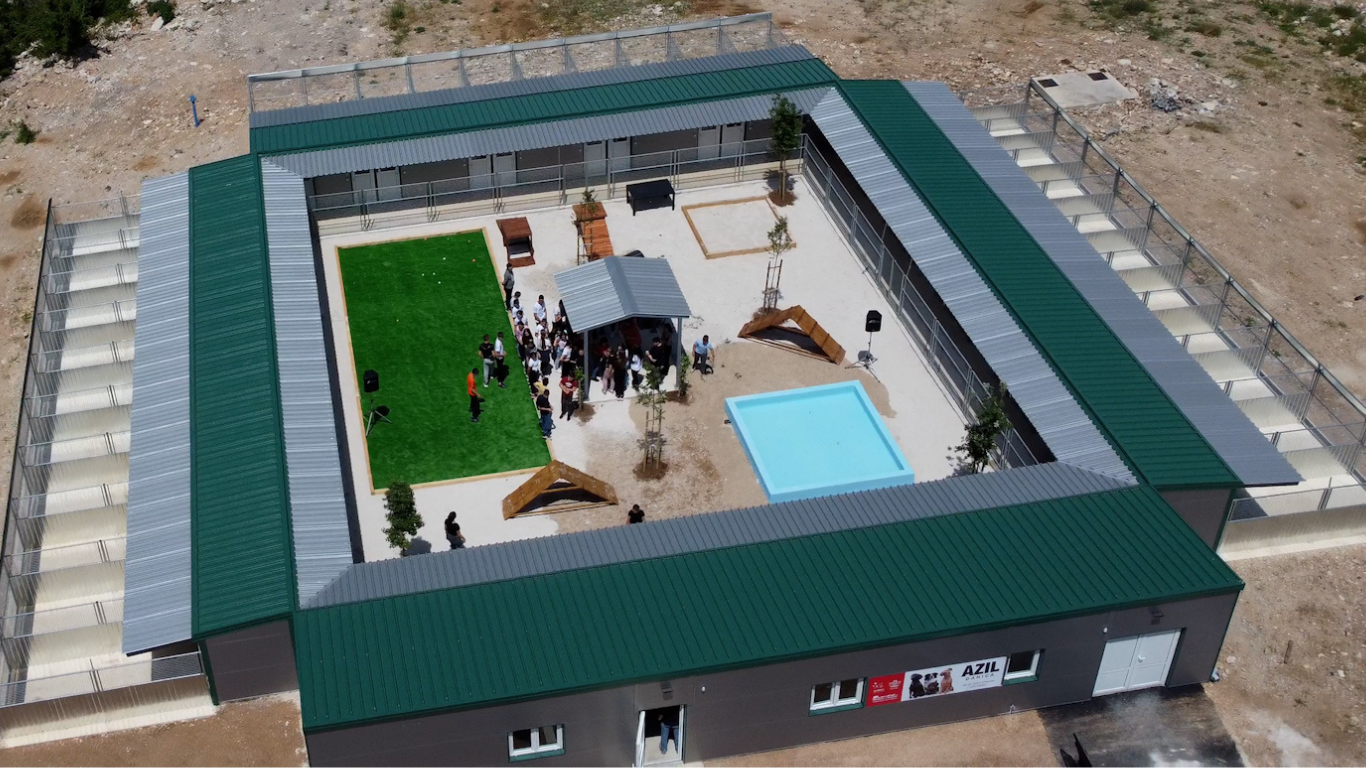

Bosnia and Herzegovina
Azil Danica Shelter
In Trebinje, a small city in south Bosnia and Herzegovina, abandoned dogs lived in a decrepit, dangerous and unhygienic shelter, perched on a rubbish dump where garbage was burned daily. We knew we had to help. Working with the local municipality for two years, we constructed a state-of-the-art shelter, leading the way for a new approach to dealing with abandoned dogs in the region.
The new shelter (Azil Danica), entirely funded by NFA, was opened in May 2023, and we immediately relocated all 78 dogs to their new home. Each dog received a full health assessment, tests for common diseases, vaccine boosters as needed and a passport. The dogs love running in the large central playground and playing in the doggie paddling pool at the new shelter.
This is only the beginning, and we now work to ensure that the shelter lives up to its stated aim of “turning street dogs into pets” by providing funds for ongoing management and staff support, training, advice, and small contingency funds for dogs with exceptional health needs. Our biggest challenge is to ensure that high standards of care are maintained and that the City of Trebinje maintains its commitment to meeting these standards so that the dogs can find their forever homes as quickly as possible.
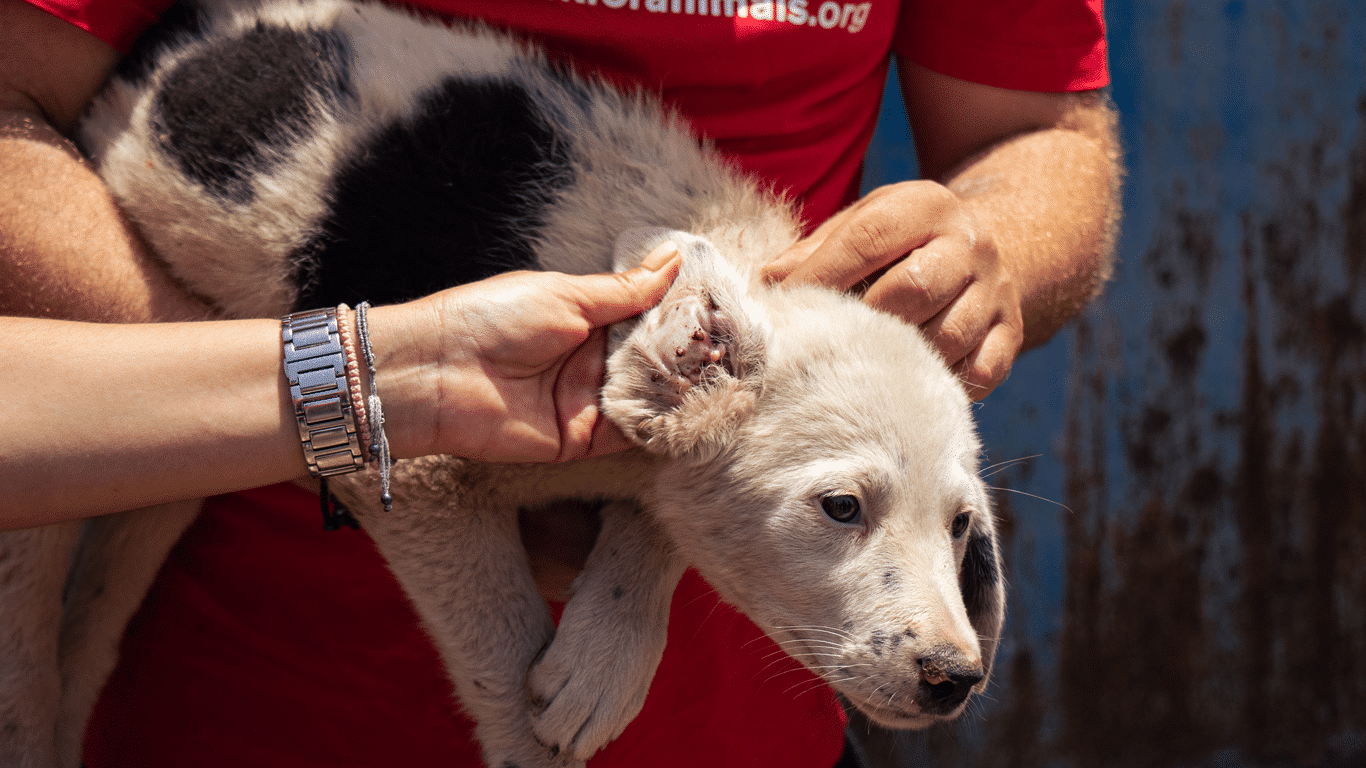

Greece
There are more than a million street dogs in Greece, many of them abandoned pets. Aspropyrgos, a huge, semi-rural area near the city of Athens, is a dumping ground for unwanted animals. After being dumped there, the dogs face deprivation, starvation and the chilling prospect of being captured and used for illegal dog fighting, which is prevalent in the area’s numerous Roma (gypsy) camps.
The dogs are so afraid that they become “ghost dogs,” so called because when our team arrives to feed them, they appear, eat and then disappear into their hiding places like ghosts.
Together with our partner organization, Ghost Dogs of Aspropyrgos, we feed, sterilize and provide veterinary care for these street dogs while trying to find them loving forever homes. For over a decade, we have also been helping the “ghost dogs” survive the cruel, cold winters that threaten their lives every year.
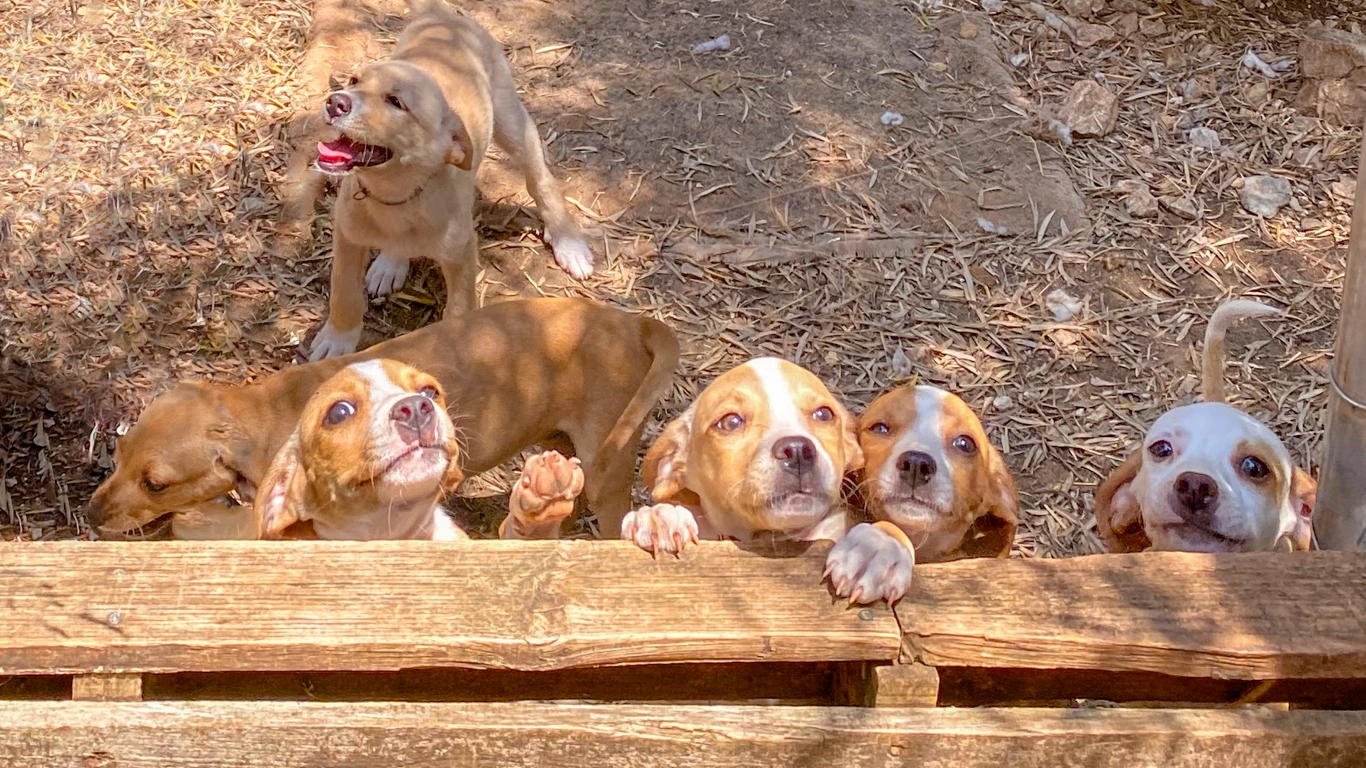

Greece
Little Friends Lefkas
In parts of Greece, many pet owners do not sterilize their dogs, either because they don’t care or because it simply never occurs to them. The result is a puppy explosion, particularly in rural areas and on the Greek islands. The heartless “solution” of the owners is to place the puppies on a road where cars are most likely to hit and kill them.
Our partner on one of the Ionian islands, Little Friends Lefkas, regularly saves the lives of puppies sent to this cruel fate. We support them in this crucial mission by helping fund food, veterinary care, transport and sterilizations, giving these innocent creatures the second chance they deserve.
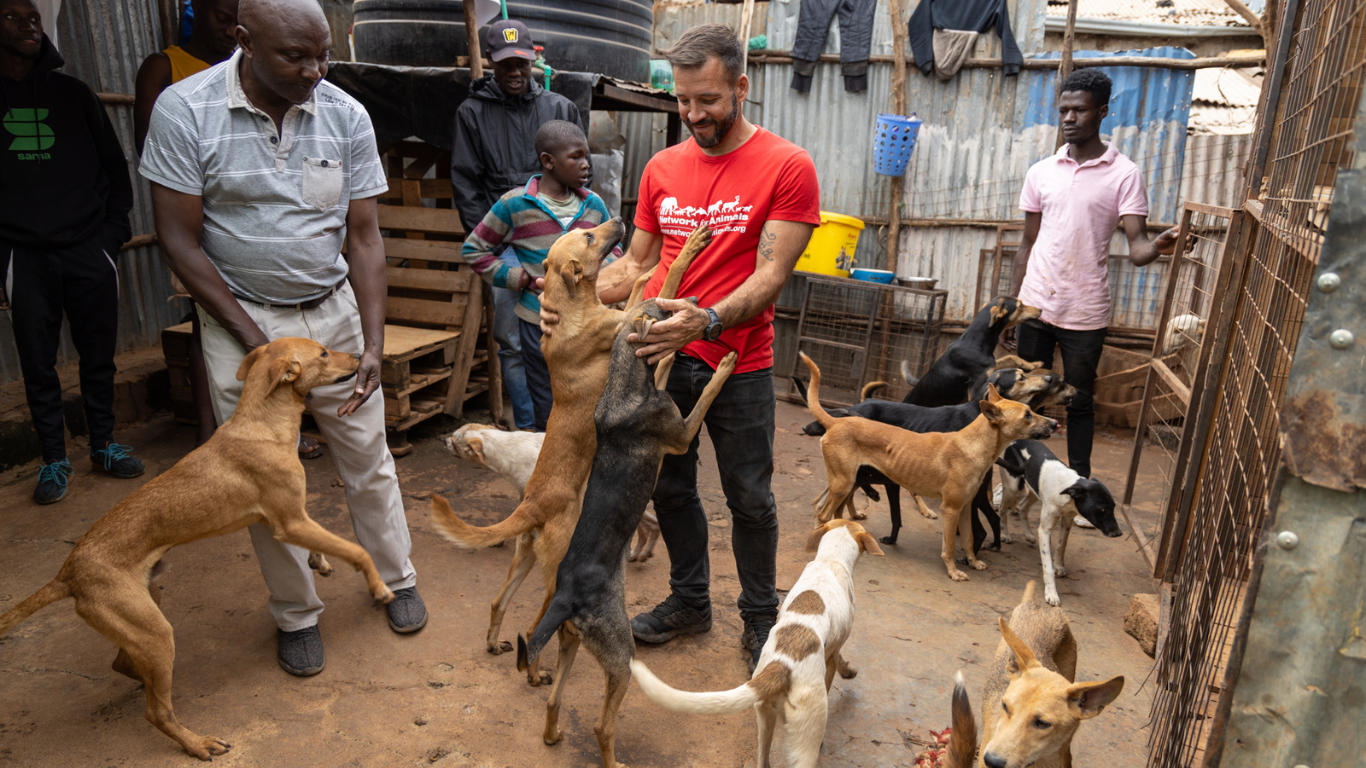

Kenya
Kenya Society for the Protection and Care of Animals (KSPCA)
In Nairobi, Kenya, we support the Kenya Society for the Protection and Care of Animals (KSPCA), which cares for more than 250 dogs at its Nairobi shelter and hundreds more in impoverished areas. It is on the frontlines of emergency rescue, cruelty investigations and community-based animal welfare programs. We have helped to cover the cost of pet food, emergency veterinary care and vaccination and sterilization campaigns for shelter and street dogs. In January 2025, a fire broke out at the shelter, destroying dog kennels and leaving more than 100 animals displaced. KSPCA was forced to place the dogs into already overcrowded kennels where the risk of stress, fighting and the spread of disease escalated daily. Thanks to the generosity of our supporters, we were able to make a significant contribution towards crucial shelter repairs, helping to rebuild kennels for the animals.
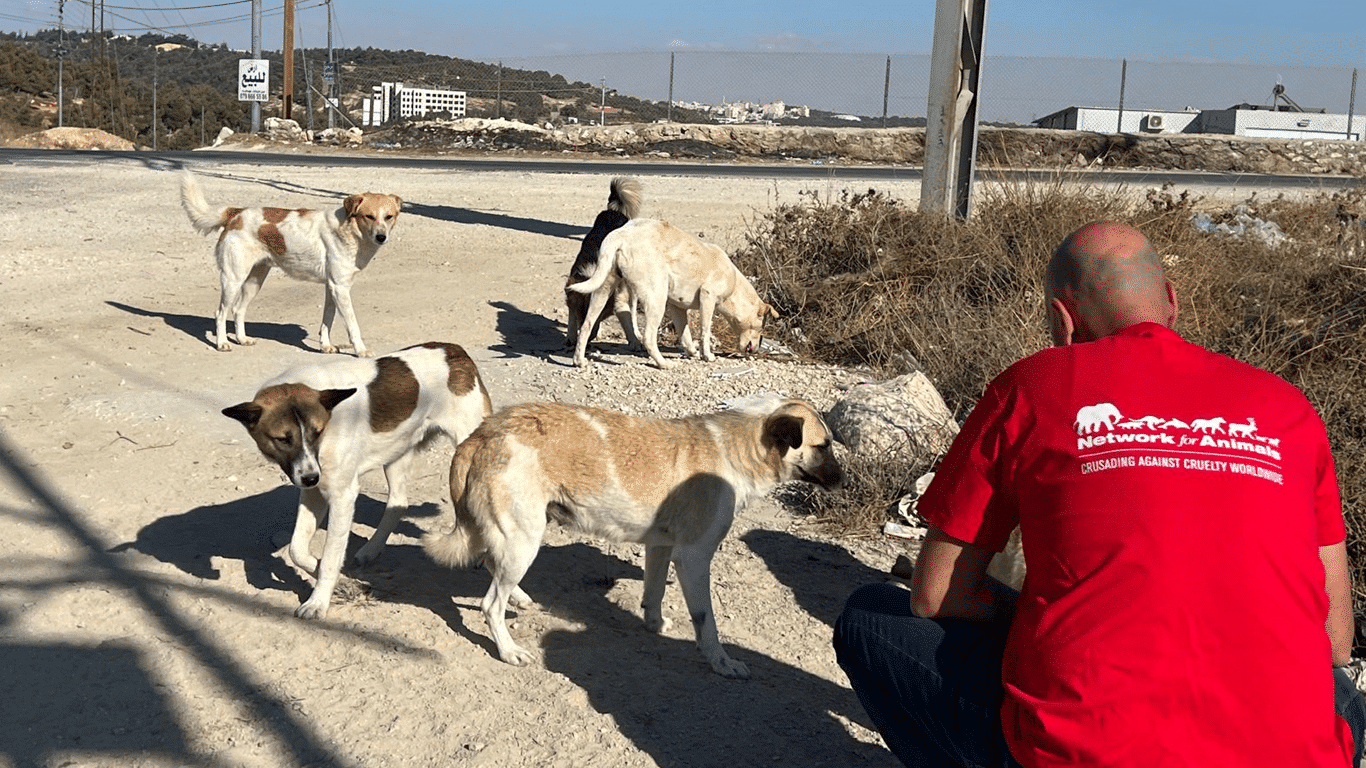

Jordan
Al Rahmeh in Amman
A group of animal lovers founded Al Rahmeh in 2017 to combat the mistreatment and demonization of the ancient Canaan dog breed in Jordan and animals in general. Their pro-life shelter is home to around 60 dogs, and they have cats in foster homes. They also run a trap-neuter-release program to keep the local cat population controlled and healthy. A number of the animals they care for have special needs, including blind, three-legged and paralyzed dogs. Network for Animals has supported the Al Rahmeh shelter and the ongoing care of its dogs and cats for the past five years.
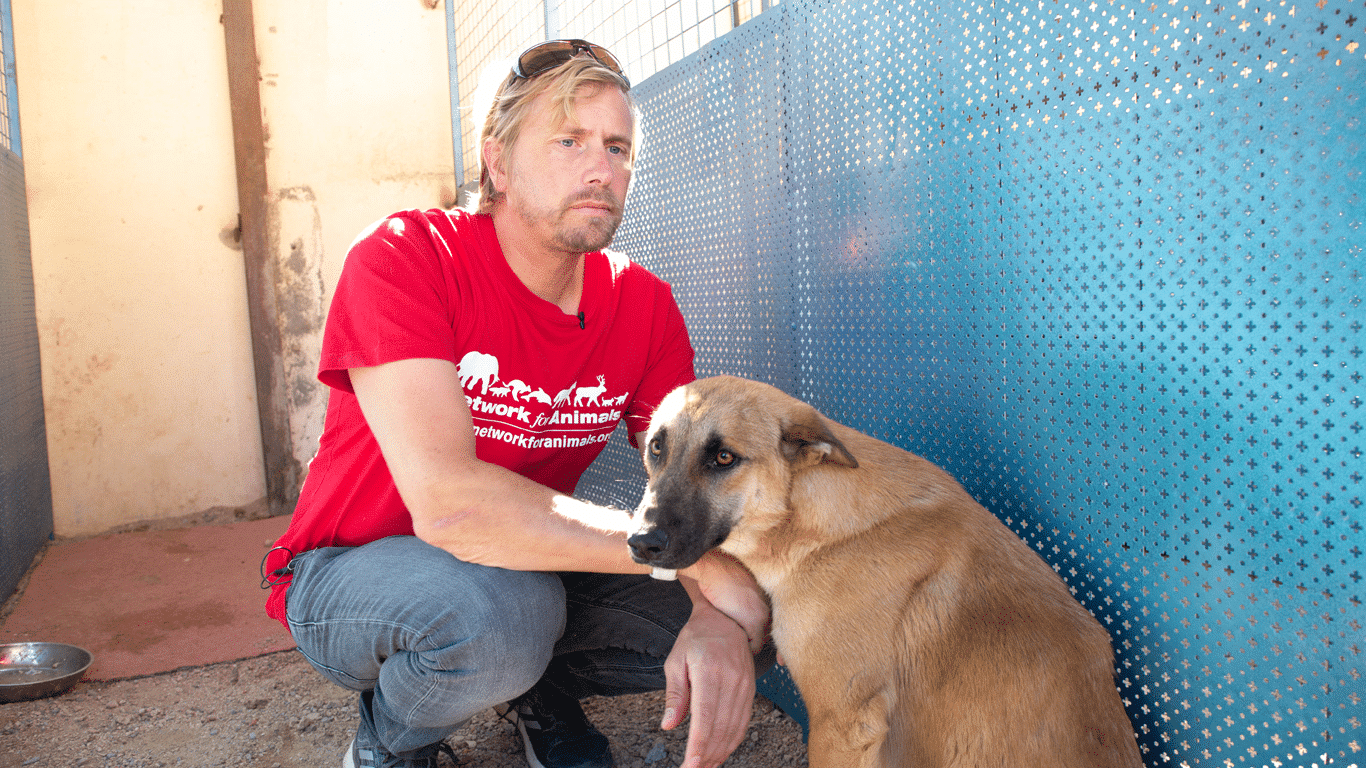

Jordan
Al Rabee Society for Nature and Animal Protection (RSNAP) in Aqaba, Jordan
Al Rabee Society for Nature and Animal Protection is a Jordan-based non-profit organization that was set up in 2013. The Al Rabee shelter is the only shelter of its kind in Aqaba and is home to more than 500 dogs. For the past three years, we have supported the shelter with the care of dogs and daily administration in a very remote area of Jordan, where resources and assistance are extremely limited. Our regular support also helps cover sterilization campaigns and food and vet bills. In 2022, we helped them move their shelter to much larger, better-suited premises. We also assisted with the installation of solar panels to help mitigate the area’s unreliable electricity supply.
Network for Animals once more stepped in by raising emergency funds for shelter repair when tragedy struck in 2023 and devastating flash floods destroyed much of the new shelter.
We also frequently assist with emergency cases. In May 2024, when heatwaves ravaged the area and put countless street dogs at risk of dehydration and death, we helped fund emergency missions to provide life-saving food and medical care for dogs suffering in the heat.
The following month, Al Rabee reached out to us with a desperate plea for help to cover medical bills for Zara, a pregnant street dog who had been shot, hit by a car and left for dead. Thanks to our supporters, we are covering Zara’s vet bills, and we are happy to say that Zara soon gave birth to a healthy litter of puppies.
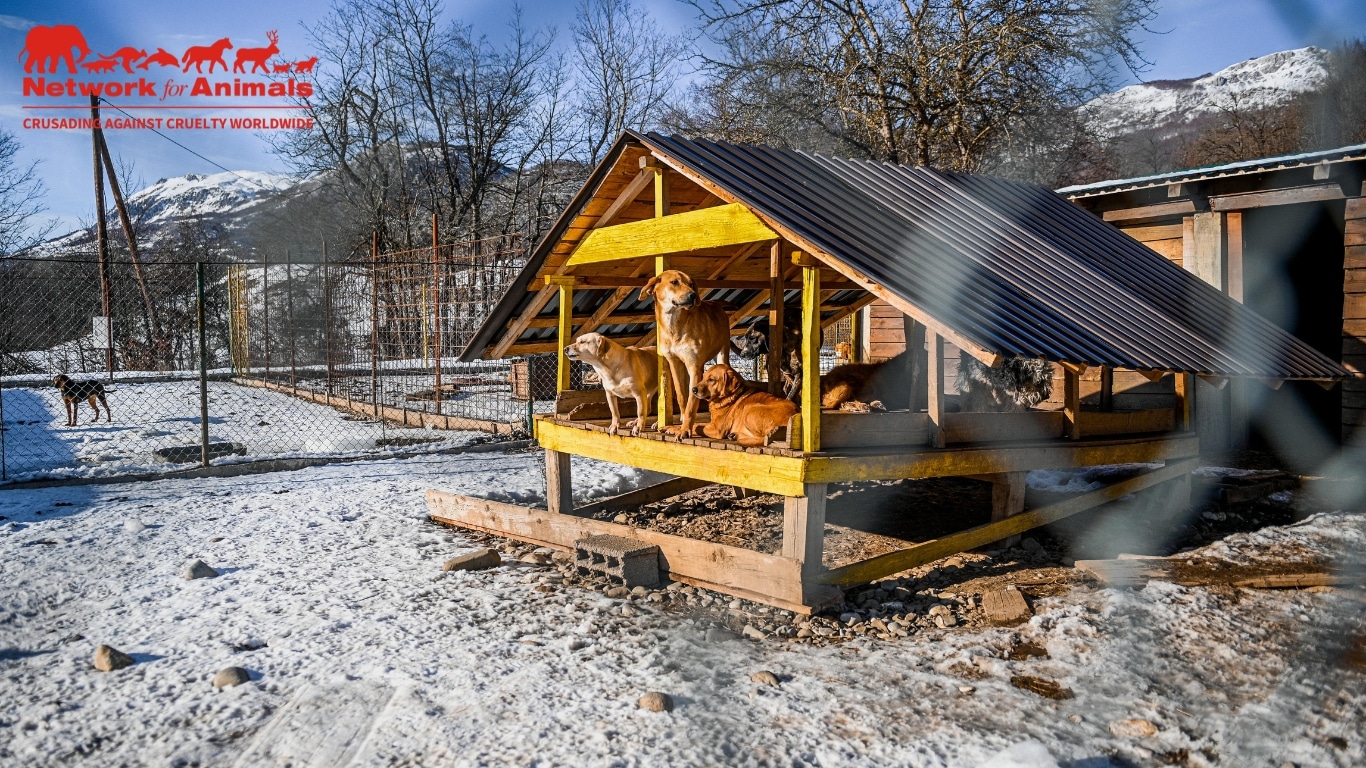

Montenegro
Improving the lives of abandoned dogs
Animal welfare is a low priority in Montenegro. We support several animal welfare projects across this small Balkan country, tackling the crisis through direct action.
The Association for the Promotion of Coexistence Korina
Animal welfare legal reforms
NFA funds the Association for the Promotion of Coexistence Korina, empowering it to run a legal advocacy project to lobby for change. Its tireless work has led to the revision of the Criminal Code, strengthening animal welfare clauses and imposing severe punishments for animal abuse.
With our support, Korina undertook the first pet dog census in Montenegro. As part of this project, the team microchipped 1,436 dogs, vaccinated 1,146 against rabies, instigated several cases and investigations against owners suspected of animal cruelty, and educated pet owners on essential animal welfare.
The team also puts pressure on municipal authorities to develop sustainable solutions to the problem of dog overpopulation and the abandonment of street dogs, both major problems in Montenegro.
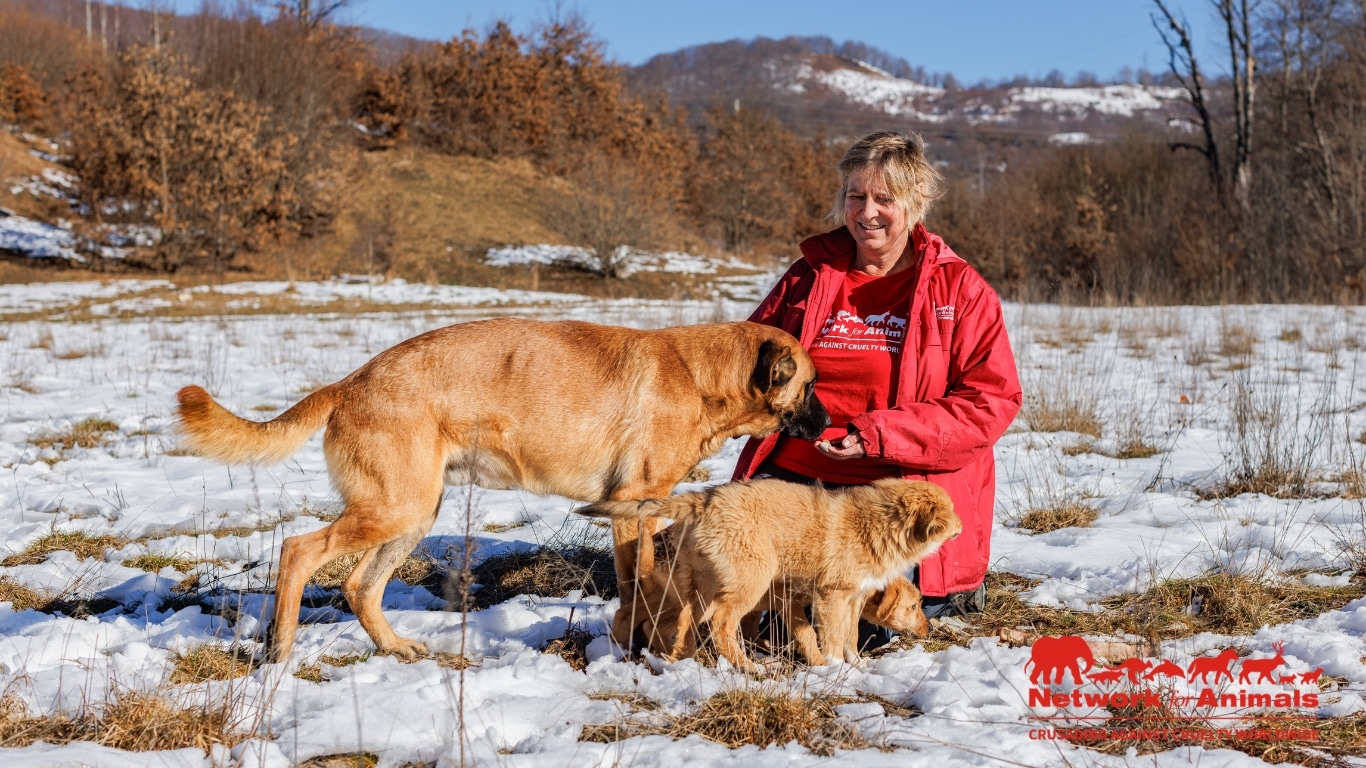
In Montenegro, municipal shelters are often underfunded, providing inadequate conditions for the animals in their care.
As such, a few dedicated individuals have taken it upon themselves to rescue the nation’s abandoned animals, pouring their own hard-earned funds into saving lives. We support as many of these private shelters as we can, providing funds for essentials such as food, medical care, kennels and fencing.
Leishmaniasis is a deadly disease which affects around 70% of the region’s street dog population. This horrific insect-borne disease can cause skin lesions, weight loss, vomiting, diarrhea and a prolonged, painful death. In June 2024, we funded crucial leishmaniasis treatments to scores of dogs in need, saving them from terrible suffering and death.
Riki’s Shelter in Kolasin, single-handedly run by cancer survivor Danijela Vuksanovic, cares for 110 rescued street dogs. We regularly provide crucial funds for food, and have funded heavily insulated kennels to protect the animals from the bitter winter snow and cold.
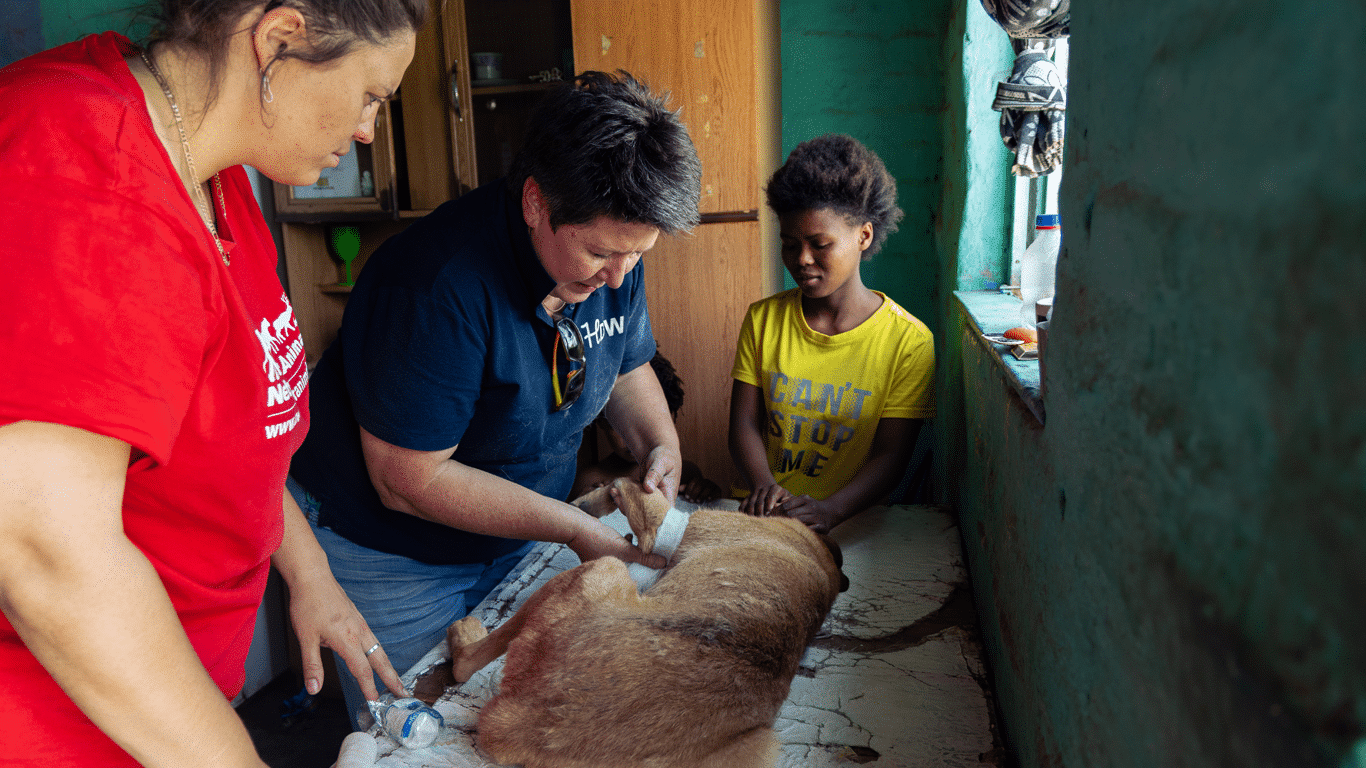

South Africa
Calvinia
In the impoverished farming town of Calvinia in South Africa’s Northern Cape Province, we work with our partner on the ground to feed over 200 dogs and cats every week in Blikkiesdorp, the region’s poorest township. We also help cover the cost of emergency veterinary care for injured and abused animals and support annual mass sterilization campaigns. Since our work began there in 2021, we have helped bring hundreds of animals back from the brink of death, conducted several mass sterilization drives and delivered tons of pet food. We continue to work closely with the community to help keep their animals healthy and fed.
In December 2024, we were able to cover the cost of feeding the 200 animals for an entire month thanks to the generosity of our supporters over the festive season.
In March 2025, Calvinia’s animals faced another threat: The knock-on effects of the cuts of US financial assistance to African charities and NGOs. As organizations and authorities scrambled to reallocate social responsibility budgets, animals were the last to receive funds. Backed by our supporters, we rushed emergency funds to our team on the ground, covering 17 sterilizations and urgent medical care for 30 dogs and cats with life-threatening injuries and disease.
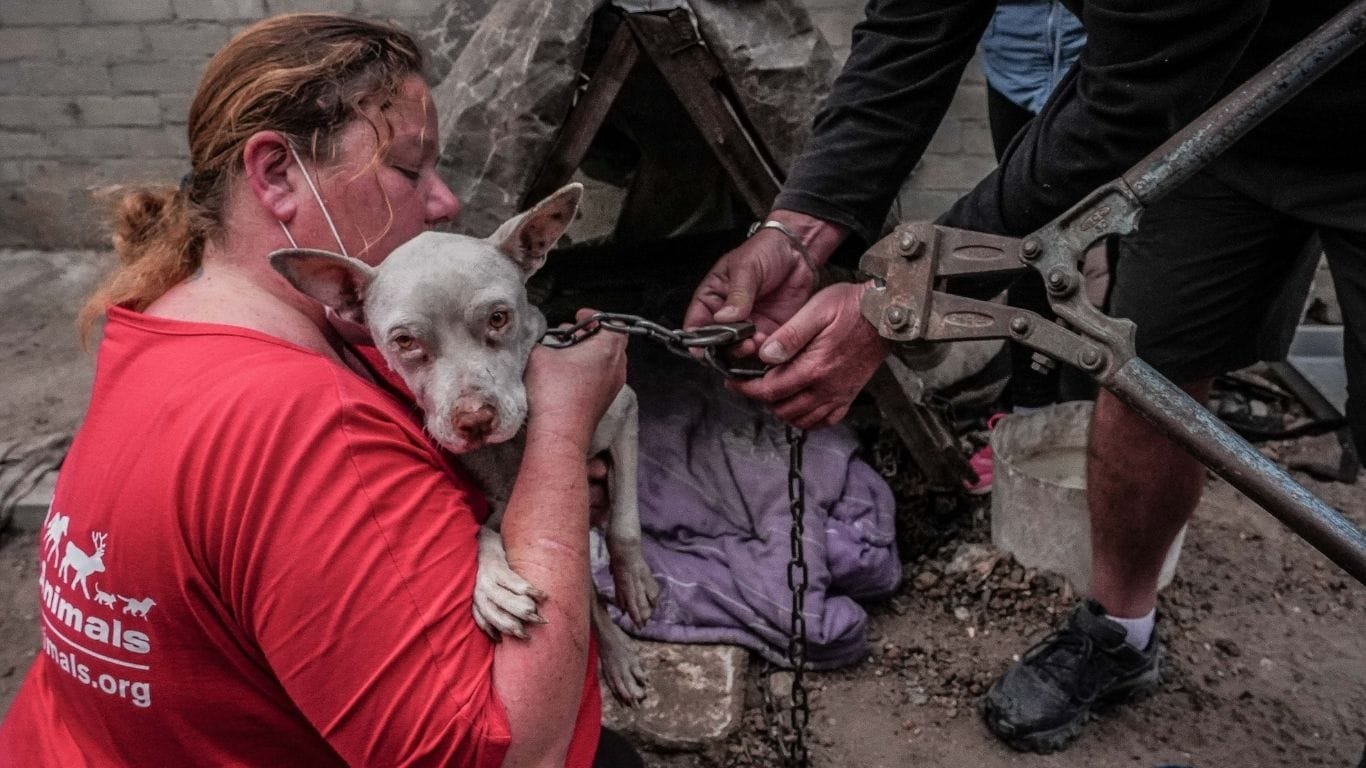

South Africa
FALLEN ANGELS
Fallen Angels Pet Rescue in the Western Cape, South Africa, is an animal shelter and outreach program that cares for more than 300 dogs and cats at its shelter and around 400 more in impoverished townships. The organization focuses on the rescue, rehabilitation and rehoming of domestic animals that are FALLEN: Forgotten, Abandoned / Abused, Lost, Lonely, Emaciated and Neglected. Fallen Angels has relied heavily on Network for Animals for the past seven years, and we have helped by providing food, funding sterilization drives and assisting with emergency dog and cat rescues and rehabilitation.
In September 2024, we supported the sterilization and vaccination of 350 dogs in Atlantis, an impoverished township plagued by gang activity and violence. Additionally, in December 2024, we helped cover the cost of food, tick and flea treatments and general veterinary care for shelter and street dogs during the festive season.
Fallen Angels was recently denied a special consent use permit to remain on its current property, but thanks to our help, it has been granted an extension to relocate. We are assisting with the site development plan for its new shelter and will also be supporting the rebuild on the new piece of land in the near future.
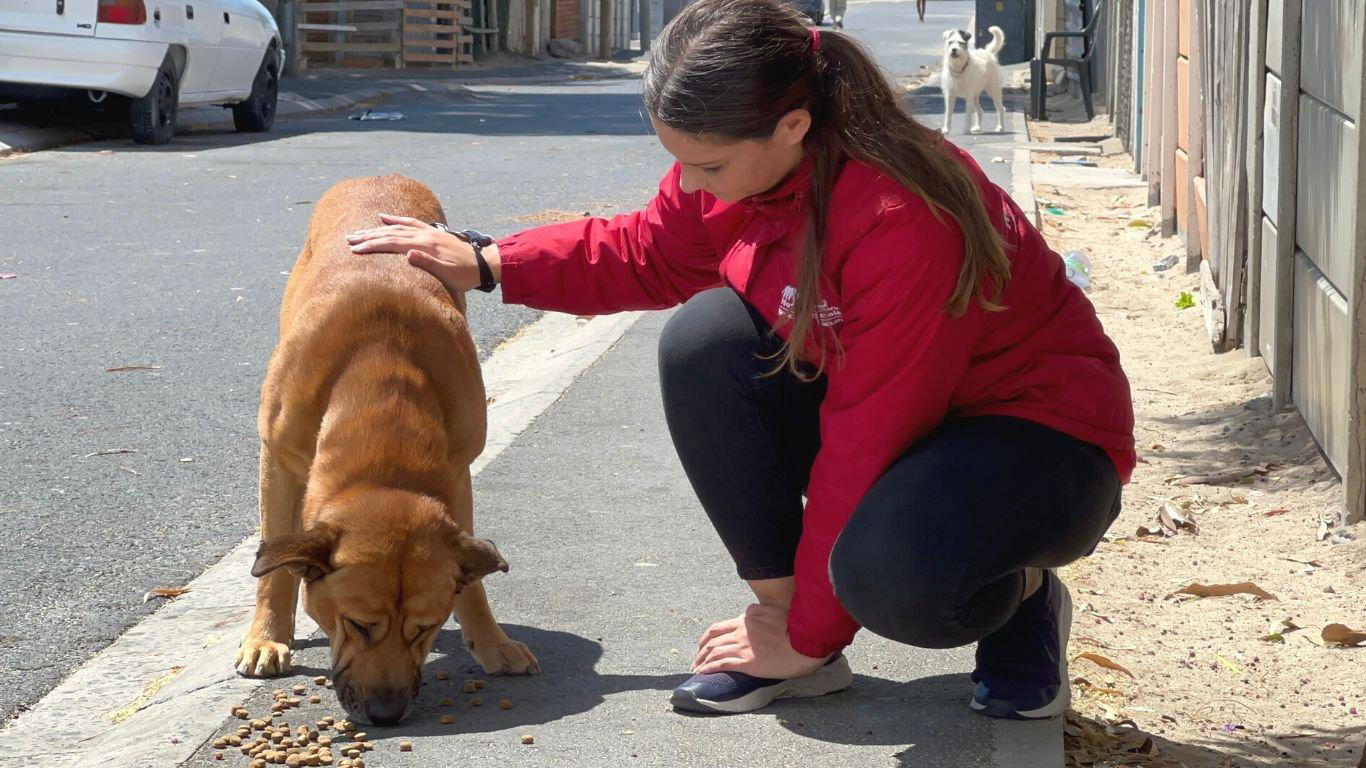

South Africa
Fur-Get-Me-Knot
Dogs are often condemned to lives of misery in the Westlake township, located in the South African city of Cape Town. Animals there are often subjected to neglect, starvation, abuse, dogfighting and over-breeding. We support Fur-Get-Me-Knot, a small group of volunteers who help animals in the area. Together, we help provide food, medical care, vital vaccinations and sterilization programs. We also educate owners on how to properly care for their animals.
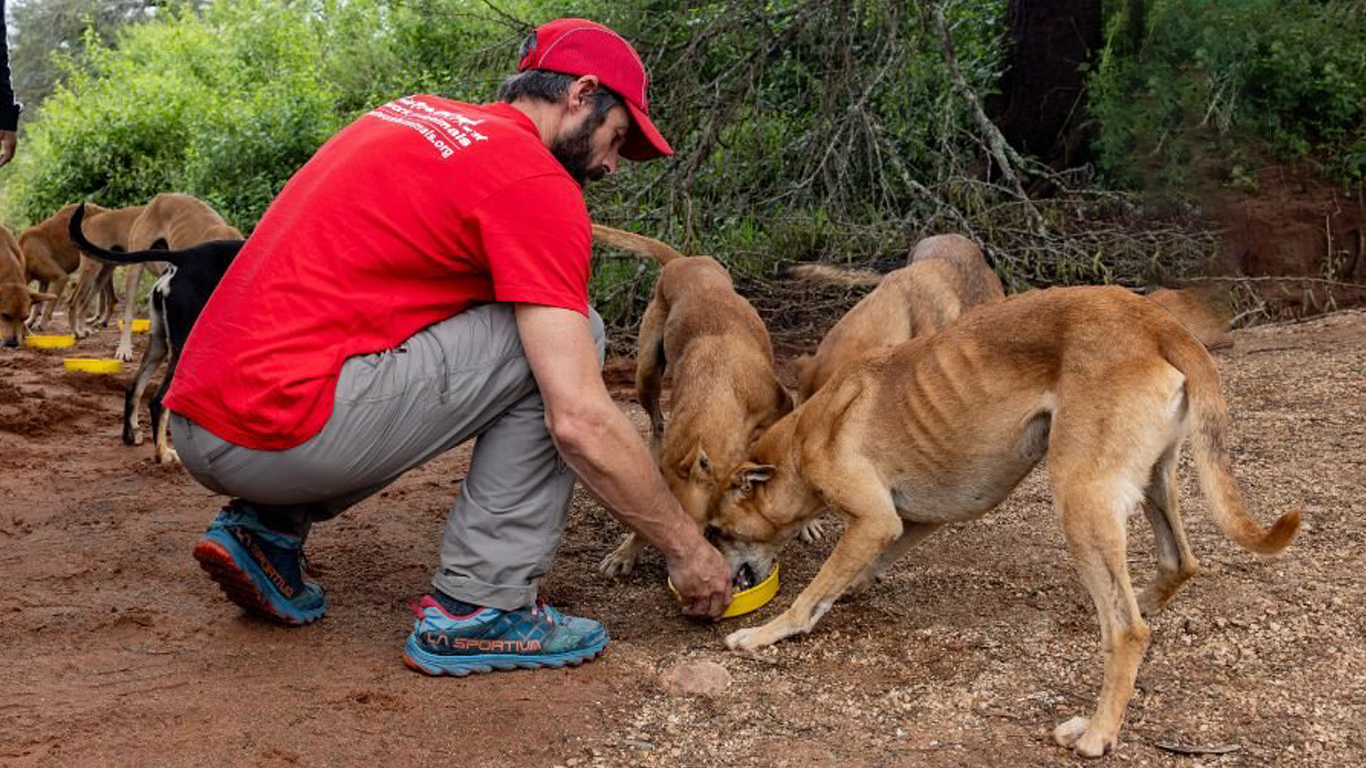

South Africa
KZN Valley Dogs
In the Valley of a Thousand Hills in South Africa’s KwaZulu-Natal province, more than 1,500 dogs living in rural areas are victims of extreme poverty, ignorance uncontrolled breeding and utter neglect. Many of these dogs are so emaciated that their ribs are visible through their scarred, parasite-riddled skin. To add to their misery, many of the dogs experience terrible abuse or suffer from dangerous infections and diseases, intestinal parasites or horrific dog-fighting and car accident injuries, including broken bones and painful lacerations.
Our partner teams venture into the region every Sunday, come rain or shine, to feed and care for as many dogs as possible. We support KZN Valley Dogs by financing rescue missions, critically needed food, sterilization campaigns and emergency veterinary intervention for countless battered and bruised dogs.
In December 2024, we fully funded the cost of food for 100 Valley dogs for one month, while in January 2025, we supported the launch of a crucial sterilization program, aiming to reduce the dog population and alleviate suffering for the animals. 50 dogs will be sterilized thanks to the generosity of our supporters.
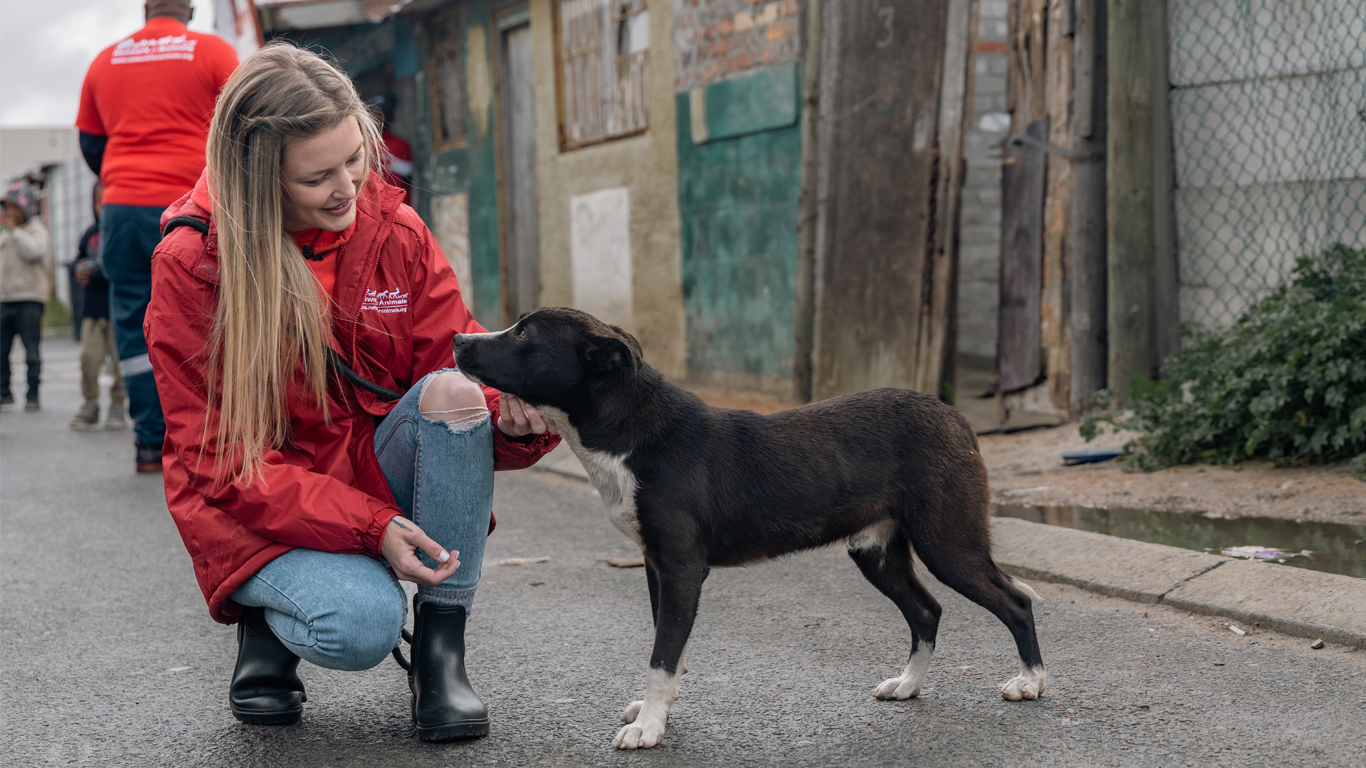

South Africa
TEARS ANIMAL RESCUE
Network for Animals supports TEARS (The Emma Animal Rescue Society) in Cape Town, South Africa. TEARS is an animal welfare organization, working around the clock to rescue, rehabilitate and rehome hundreds of dogs every year. The TEARS dog shelter provides excellent veterinary care. Of particular importance are its outreach programs in impoverished communities, where teams rescue and rehome street dogs and provide care for pets whose owners cannot afford sterilizations and medical treatment. Our supporters have allowed us to help animals at TEARS for nearly a decade by providing funding for much-needed food, vital search and rescue missions, equipment and veterinary care. We have helped them buy a new outreach vehicle tough enough to withstand the poor roads in township areas.
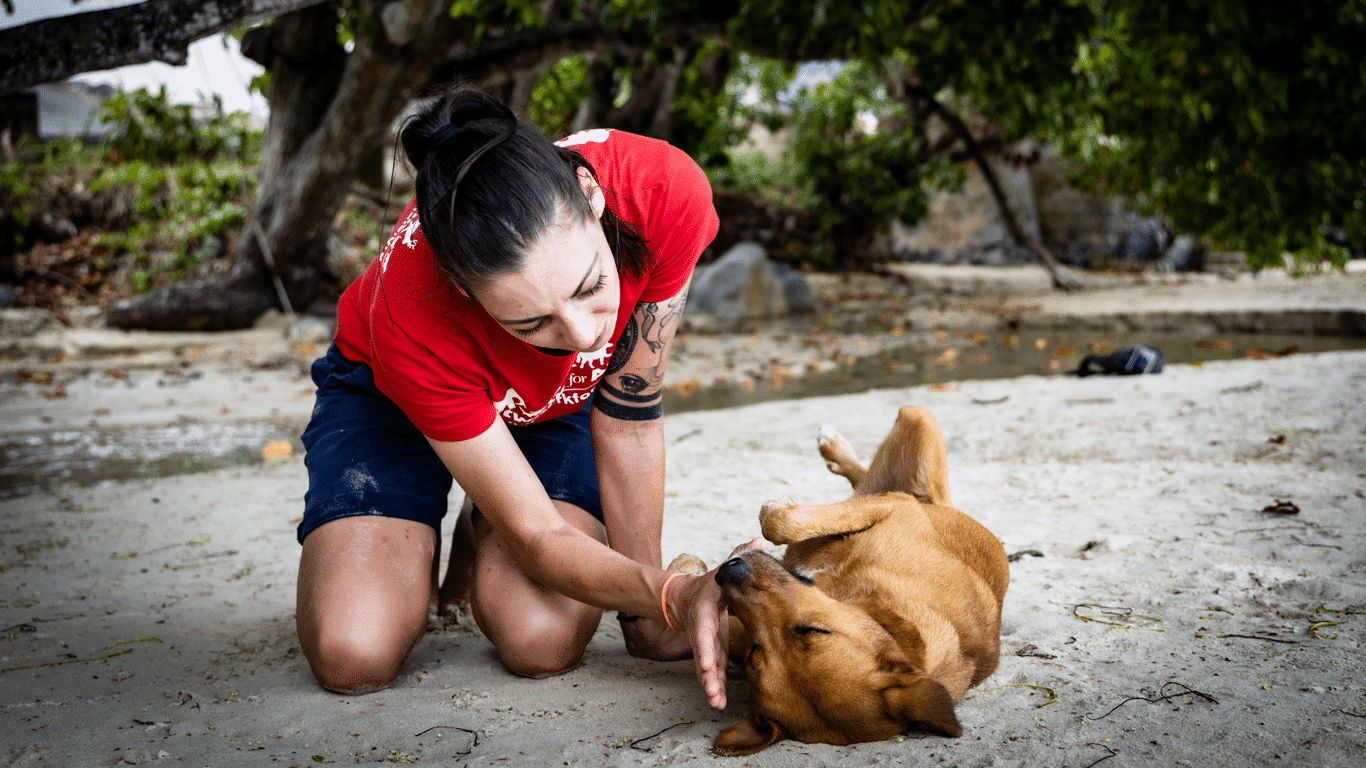

Seychelles
Seychelles Society for the Protection and Care of Animals (SSPCA).
While the Seychelles is a paradise for tourists, it’s a living nightmare for street dogs. Homeless, starved and riddled with blood-sucking parasites, these poor souls have no-one to turn to but our partner, the Seychelles Society for the Protection and Care of Animals (SSPCA).
Through our donors’ support, we helped fund crucial medical supplies to treat the animals and paid for a kennel hand for a year to ensure that the dogs are kept healthy, happy and comfortable at the shelter.
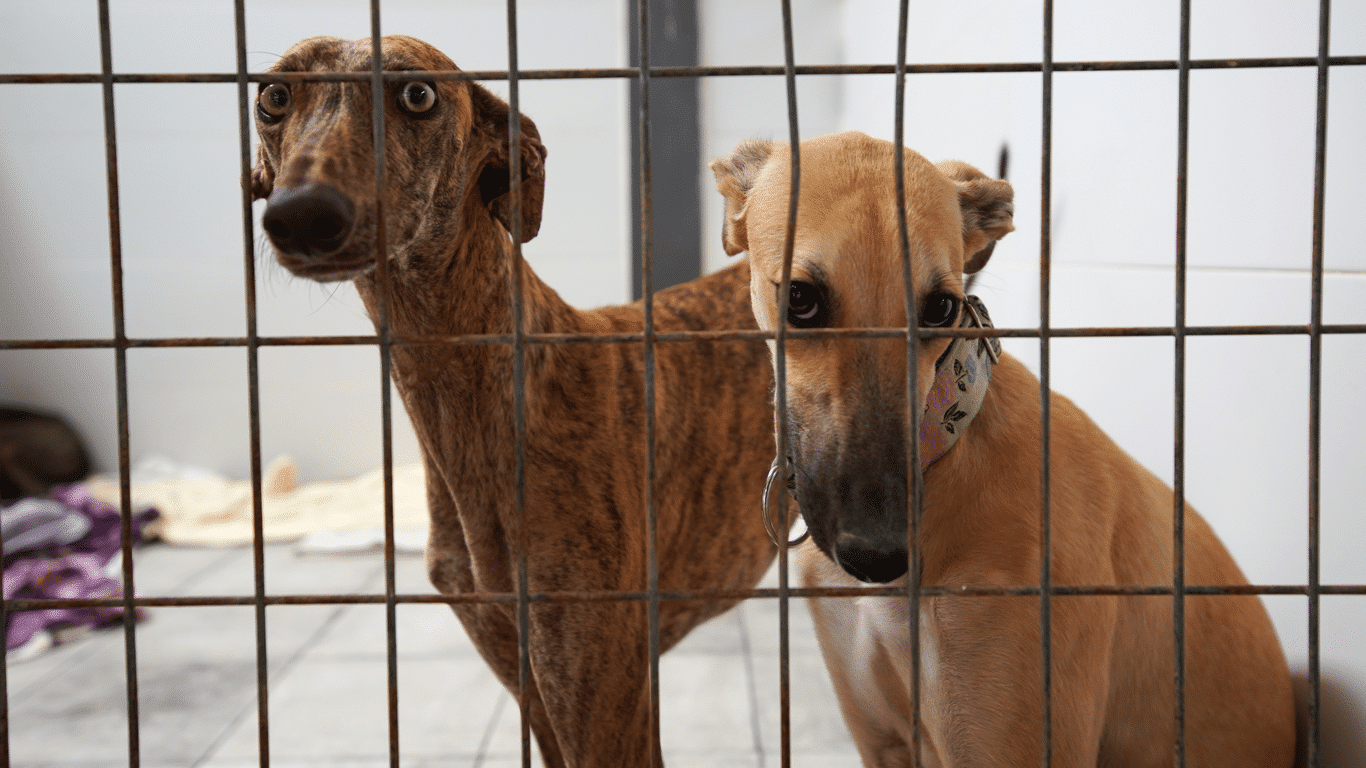

Spain
give Spanish greyhounds the protection they deserve
In Spain, hunting dogs, known as galgos and podencos, are tortured and killed in their tens of thousands each year. These poor creatures are exploited for a single hunting season before being cruelly tortured and discarded like trash. The depth of suffering they endure is unimaginable; they are starved, hurled into dark wells, savagely beaten, targeted in shooting practices, poisoned or, possibly worst of all, hung from trees until they slowly suffocate to death. This cruelty is inflicted on the dogs if they disrespect their ‘owners’ for not being sufficiently aggressive. We cannot stand idly by with a clear conscience as this abuse persists.
We are working with four organizations, Sociedad Valenciana Protectora de Animales y Plantas, Jadoul Foundation, Galgos del Sur and PACMA, who work to provide the best possible care to animals in need, like abused, traumatized and discarded galgos.
Compounding the plight of galgos is the fact that they have no legal protection. These dogs are classified as agricultural animals, exposing them to relentless abuse and death. With the support of our donors, we are exposing them to legally condoned fighting this ruling in Spanish courts, petitioning the government to amend the laws to give galgos the protection they deserve while shining a light on the dark underbelly of the Spanish hunting industry.
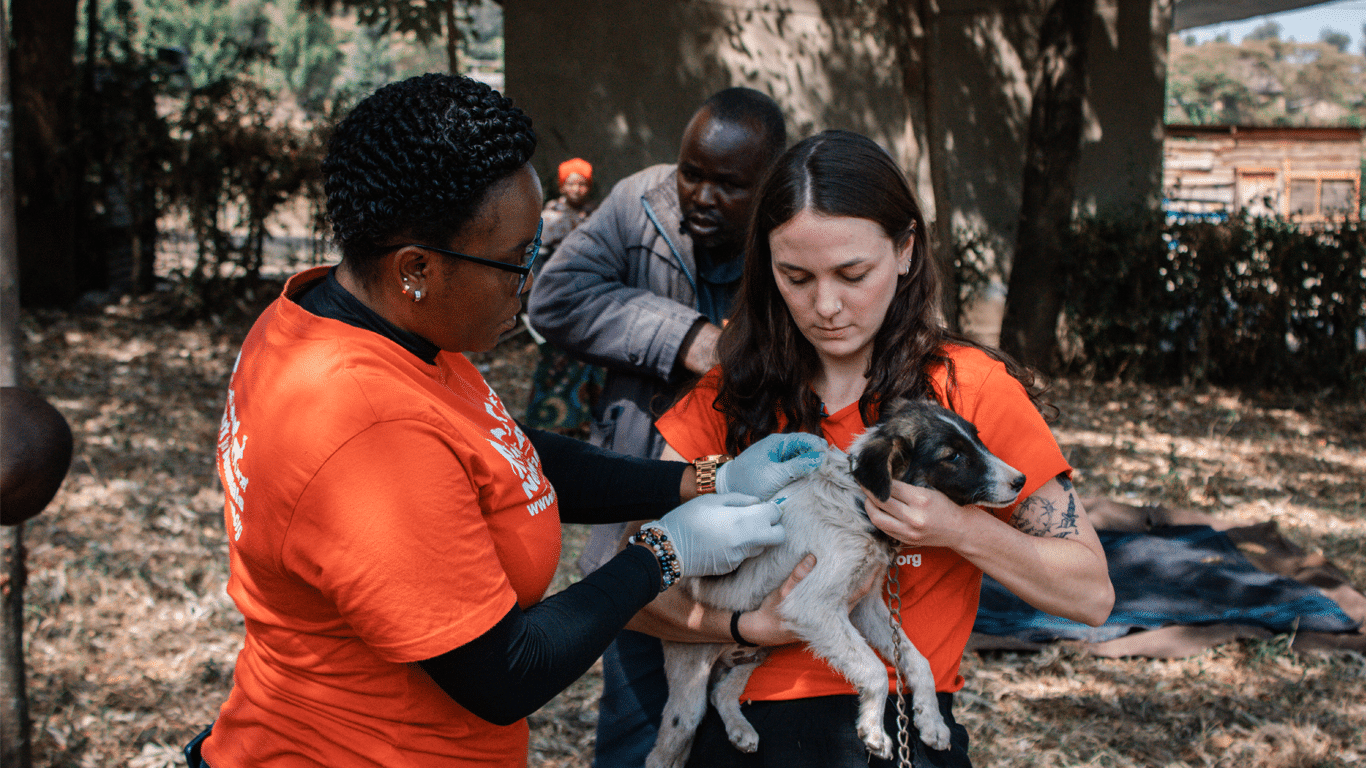

Tanzania
Arusha Society for the Protection of Animals (ASPA)
In Tanzania, Network for Animals supports the Arusha Society for the Protection of Animals (ASPA), a small but dedicated organization working to improve the welfare of Tanzania’s street dog population. In addition to the frequent funding, we provide:
- food and veterinary supplies,
- helps finance emergency rescues,
- mobile clinics,
- sterilizations,
- rabies vaccinations, and educational outreach programs.
ASPA works to deworm, vaccinate, sterilize and provide veterinary treatment for as many street dogs in rural areas as possible. Through our donors’ generosity, we funded a fully-equipped mobile veterinary unit to provide care to these vulnerable animals in a secure and stress-free environment.
Since 2023, we have vaccinated more than 1,000 village dogs in rural areas.


Thailand
Rescue P.A.W.S
In Thailand, animal neglect is disturbingly common. Our partner, Rescue P.A.W.S., who takes in severely disabled dogs who will live out the rest of their lives at the shelter. With more and more dogs pouring into the shelter, our partner quickly reached capacity, and we helped them build new enclosures and kennels for the disabled and abandoned dogs in their care.
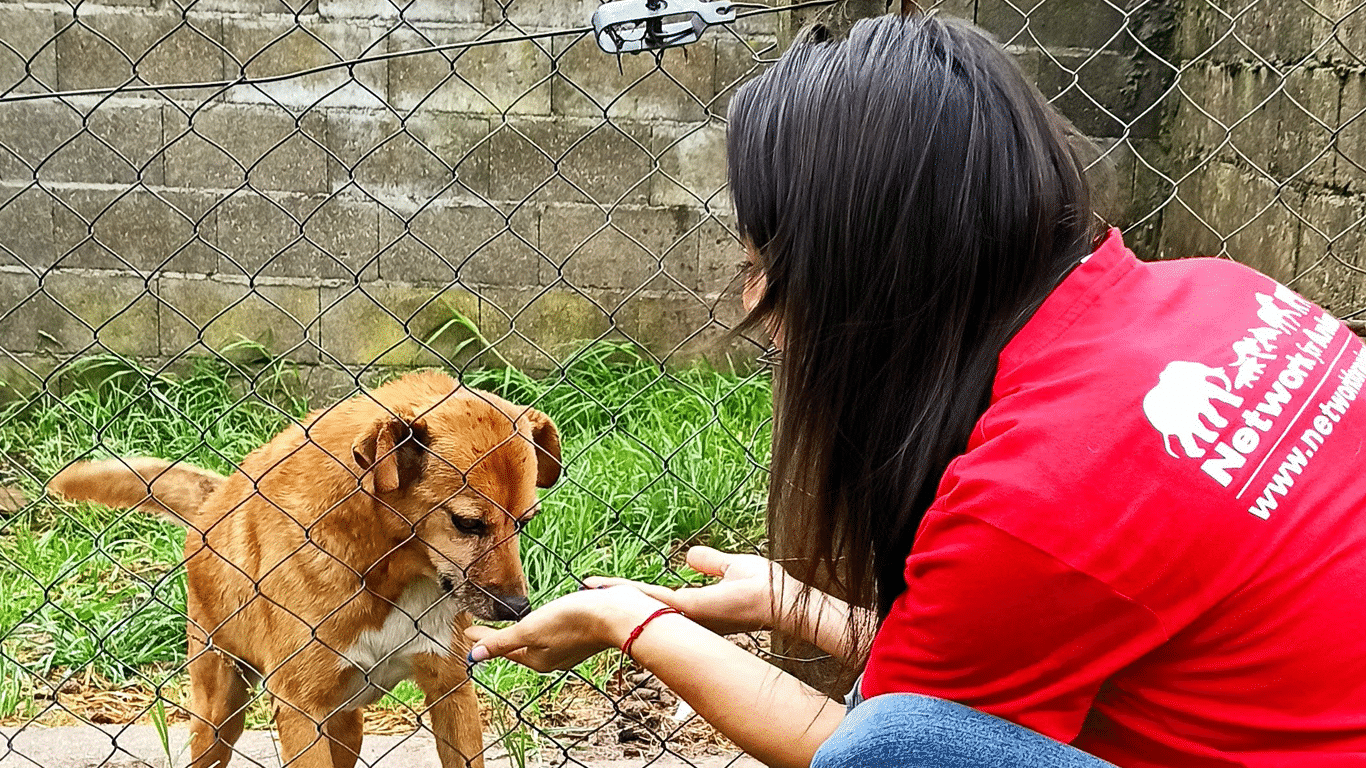

Uruguay
A.P.A. El Refugio animal shelter
We have supported Montevideo’s A.P.A. El Refugio animal shelter since 2018. With no support from local authorities, the shelter cares for 3260 street dogs and 340 cats. Network for Animals has helps cover the monthly cost of expensive food and specialist medical care. In recent years, El Refugio has suffered from an attack by gangsters, fire and flooding. In each case we provided emergency funding . We have also helped rush vital medications and fund specialist veterinary care for elderly and disabled dogs in their care.
The shelter never turns away an animal in need, sparing no expense to give their rescues the best possible care. But with no help from the authorities, in 2025 he team recently accumulated significant debt; and vets were threatening not to treat its animals until their bills were paid. Network for Animals sent emergency funding to settle their vet bill, ensuring the team can continue saving animal lives.
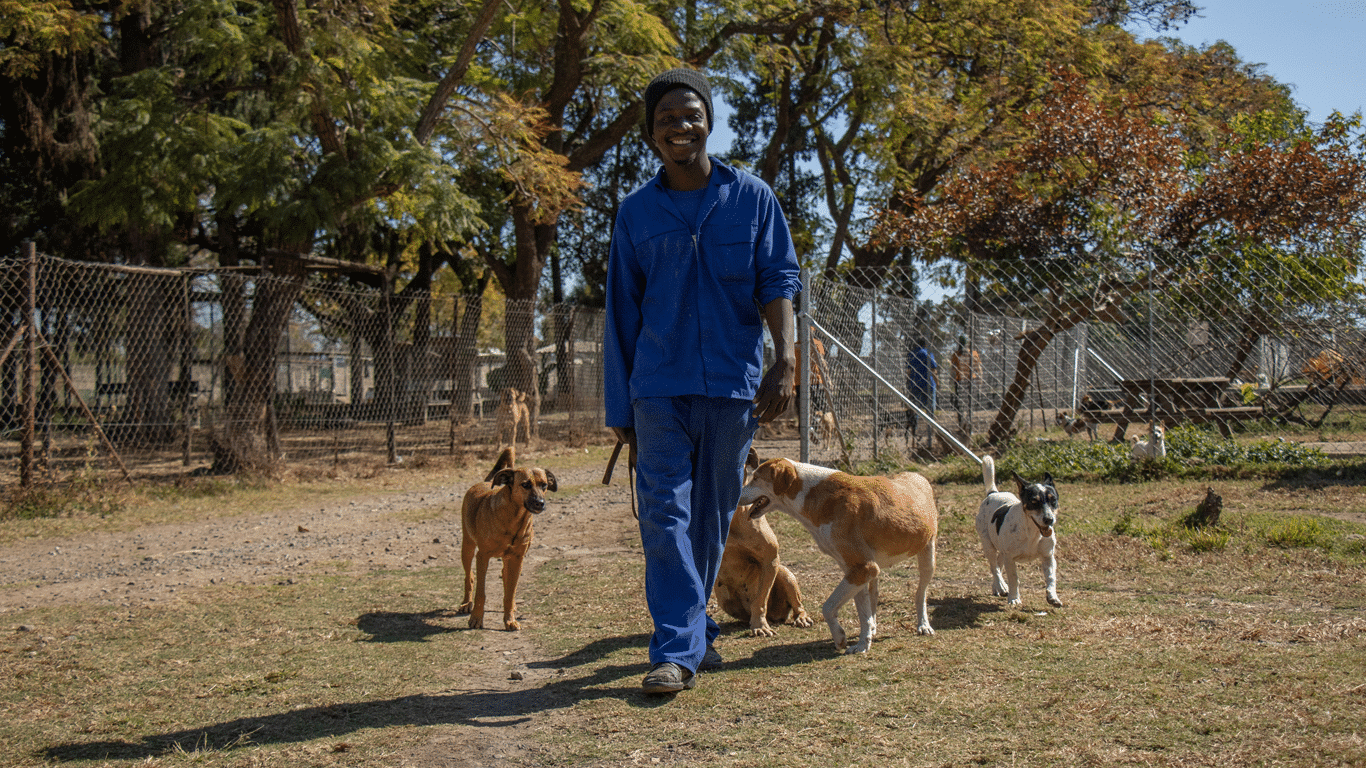

Zimbabwe
The Friend Animal Foundation (FAF)
In Zimbabwe, we support Harare’s Friend Animal Foundation (FAF). Following the death of its owner, FAF was on the brink of financial ruin and closure. Hundreds of animals were at risk of being euthanized by the authorities. With the help of our generous supporters, Network for Animals kept the doors of FAF open, initially delivering 4,134 pounds of food to the dogs and providing staff to help care for the animals. We continue to assist FAF with much-needed renovations and improvements for all the animals in its care. Alongside almost 500 canine residents, the no-kill shelter is a sanctuary for 145 cats, horses, goats and a donkey.




